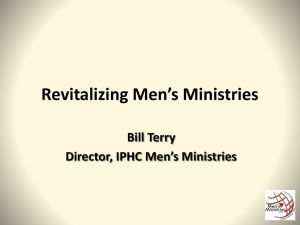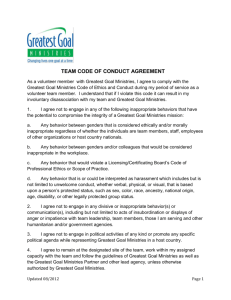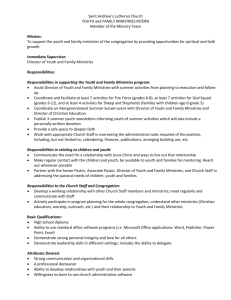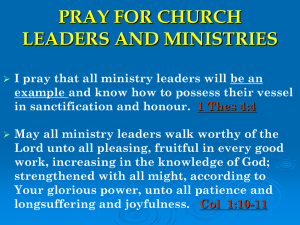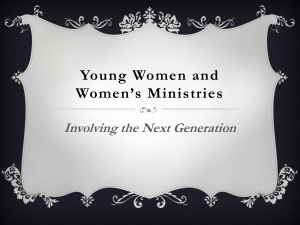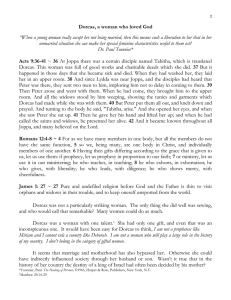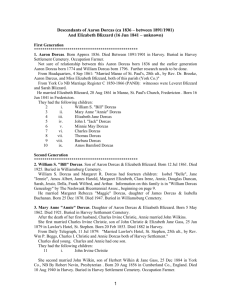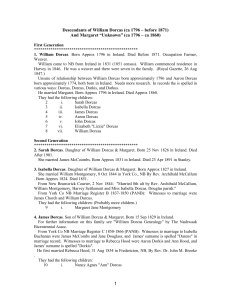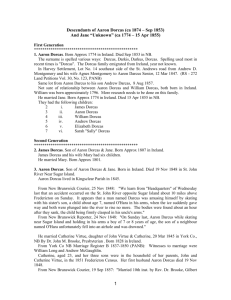Women`s Ministries and Dorcas - Adventist Women`s Ministries
advertisement
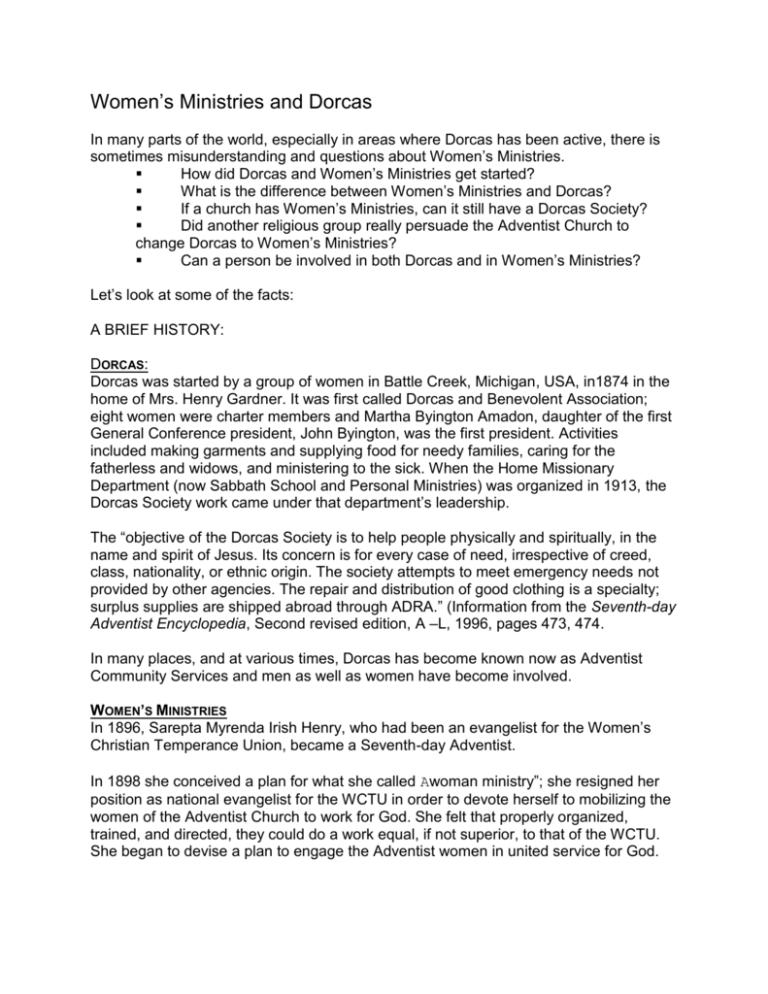
Women’s Ministries and Dorcas In many parts of the world, especially in areas where Dorcas has been active, there is sometimes misunderstanding and questions about Women’s Ministries. How did Dorcas and Women’s Ministries get started? What is the difference between Women’s Ministries and Dorcas? If a church has Women’s Ministries, can it still have a Dorcas Society? Did another religious group really persuade the Adventist Church to change Dorcas to Women’s Ministries? Can a person be involved in both Dorcas and in Women’s Ministries? Let’s look at some of the facts: A BRIEF HISTORY: DORCAS: Dorcas was started by a group of women in Battle Creek, Michigan, USA, in1874 in the home of Mrs. Henry Gardner. It was first called Dorcas and Benevolent Association; eight women were charter members and Martha Byington Amadon, daughter of the first General Conference president, John Byington, was the first president. Activities included making garments and supplying food for needy families, caring for the fatherless and widows, and ministering to the sick. When the Home Missionary Department (now Sabbath School and Personal Ministries) was organized in 1913, the Dorcas Society work came under that department’s leadership. The “objective of the Dorcas Society is to help people physically and spiritually, in the name and spirit of Jesus. Its concern is for every case of need, irrespective of creed, class, nationality, or ethnic origin. The society attempts to meet emergency needs not provided by other agencies. The repair and distribution of good clothing is a specialty; surplus supplies are shipped abroad through ADRA.” (Information from the Seventh-day Adventist Encyclopedia, Second revised edition, A –L, 1996, pages 473, 474. In many places, and at various times, Dorcas has become known now as Adventist Community Services and men as well as women have become involved. WOMEN’S MINISTRIES In 1896, Sarepta Myrenda Irish Henry, who had been an evangelist for the Women’s Christian Temperance Union, became a Seventh-day Adventist. In 1898 she conceived a plan for what she called Awoman ministry”; she resigned her position as national evangelist for the WCTU in order to devote herself to mobilizing the women of the Adventist Church to work for God. She felt that properly organized, trained, and directed, they could do a work equal, if not superior, to that of the WCTU. She began to devise a plan to engage the Adventist women in united service for God. At this time she received a letter from Ellen G. White who was then in Australia that said in part: “Sister Henry: ....I have thought, with your experience, under the supervision of God, you could exert your influence to set in operation lines of work where women could unite together to work for the Lord. There certainly should be a large number of women engaged in the work of ministering to suffering humanity, uplifting, educating them how to believe—simply believe—in Jesus Christ our Savior…. I am pained because our sisters in America are not more of them doing the work they might do for the Lord Jesus.... Many women love to talk. Why can=t they talk the words of Christ to perishing souls? The more closely we are related to Christ, the more surely the heart will know the wretchedness of souls who do not know God.... (Signed) Mrs. E. G. White.@ Now that her idea had become a specific assignment, and she felt she had the green light to go ahead, Mrs. Henry began enthusiastically to work out her dreams in a practical way. In her book A Woman Ministry, she stated her vision of the work women could do in their own homes and then she continued: “It must go from our women to all the homes the world over. And when each woman among our people shall come to appreciate her opportunity, and rejoice in it, realizing not the burdens she must bear, but the abundant strength that is given with which to carry them, seeing not the danger from the lions in the way, but how they quail and fawn before the courage of even a weak woman=s mighty faith; then shall our ministry go abroad in their work, strong, refreshed, victorious.” Another letter from Ellen G. White stated: AThe work you are doing to help our sisters feel their individual accountability to God is a good and necessary work. Long has it been neglected; but when this work has been laid out in clear lines, simple and definite, we may expect that the essential duties of the home, instead of being neglected, will be done much more intelligently. The Lord would ever have us urge upon those who do not understand the worth of the human soul. If we can arrange, as you are now working, to have regularly organized companies intelligently instructed in regard to the part they should act as servants of the Master, our churches will have life and vitality such as have been so long needed. ....Our sisters have generally a very hard time, with their increasing families and their unappreciated trials. I have so longed for women who could be educators to help them to arise from their discouragement, and to feel that they could do a work for the Lord. And this effort is bringing rays of sunshine into their lives, and is being reflected upon the hearts of others. God will bless you, and all who shall unite with you, in this grand work.@ In 1899 Mrs. Henry published a weekly column in the Adventist Review headlined, “Woman=s Gospel Work.” The column was filled with Bible studies, poetry, letters, and practical advice. In 1900, while attending a General Conference committee meeting, Mrs. Henry became sick and died. Her associates carried on her work for a short time before becoming discouraged, and they too quit. Women’s Ministries died too. When women, especially in North America began to again see the need for and urge the development of Women’s Ministries, no one even remembered about Sarepta Henry. As a result of several commissions and advisories, the North American Division appointed a Women’s Ministries leader in 1989. Then in 1990, at the Annual Council, Rose Otis was appointed as director of the Office of Women’s Ministries at the General Conference. In 1995, at the General Conference Session in Utrecht, the Netherlands, Women’s Ministries became a full department. PURPOSE AND OBJECTIVES: DORCAS: Dorcas has been, and continues to be, an important part of the church program; however, it is not a department of the church. It is an outreach of the Sabbath School Personal Ministries Department for reaching out into the community, primarily in helping the poor and needy. Since it was first begun by a group of women it has become broader in its nature. This is because in many places the help of men is needed. However, in other areas such as Africa where women have not been as actively involved in many areas of church leadership, Dorcas has become extremely important. Women have taken care of the program and have made it not only an outreach for the church but an area where women can take leadership, women can have training, women can have retreats and many other activities. According to page 94 of the 2000 Church Manual: Community Services/Dorcas Society— The Community Services/Dorcas Society is an important feature of the outreach (missionary) activities of the church. The leader of this society, the assistant leader (if needed), and the secretary-treasurer, are elected at the regular church election. This society gathers and prepares clothing, food, and other supplies for the poor, needy, and unfortunate. This organization works in close cooperation with the deacons and deaconesses of the church. Community Services/Dorcas ministry, however, includes more than giving material aid; it encompasses also adult education, visiting, homemaking, home nursing, counseling, and other services. The church Personal Ministries Department has primary responsibility for this work. However, the General Conference Personal Ministries Department web site does not mention Dorcas or Community Services (as of February 2004). WOMEN’S MINISTRIES Women’s Ministries was started for a very different reason than Dorcas but one that complements the work of Dorcas. The purpose of Women’s Ministries is to train and empower women to become involved in all areas of the church and to help women be able to not only know how to use their various God-given talents but to have opportunity to use them. Women’s Ministries can help a Dorcas woman be a better Dorcas leader, and be a better Dorcas worker, but also develop other types of ministries. It may help in AIDS education, it may help her to be a better mother, it may help her learn how to become involved on church/conference/union or even division committees, or take leadership in various other church departments. Women’s Ministries helps produce spiritual growth materials as well as funding for scholarships for women. It organizes and sponsors literacy programs around the world. It becomes involved in public evangelism and evangelism to specific populations such as Muslim women. Women’s Ministries has also become active in abuse prevention and healing, even sponsoring the action of the world church to have an Abuse Prevention Emphasis Day each August. You can see that Women’s Ministries has a wide variety of activities. SUMMARY You might say that the focus of Dorcas is more by the women of the church on people outside the church; and the focus of Women’s Ministries is on the women in the church so that they can then minister to others in and out of the church. One of the misconceptions regarding Dorcas and Women’s Ministries is that women can only serve in one place in the church and so they either have to serve in Dorcas, or Dorcas has to be done away with and take on Women’s Ministries. This is not true. Women can belong to both Dorcas and Women’s Ministries and possibly be involved in Children’s Ministries and Health Ministries and Family Ministries and many other things at the same time—whatever appeals to the individual woman and wherever the Lord leads that individual woman. It is our hope that as a result of Women’s Ministries, Dorcas will become even stronger and will find new and better ways of ministering and that women who may not be interested in Dorcas may find strength and empowerment to develop and become involved in other ministries that can help forward the mission of the Church.

